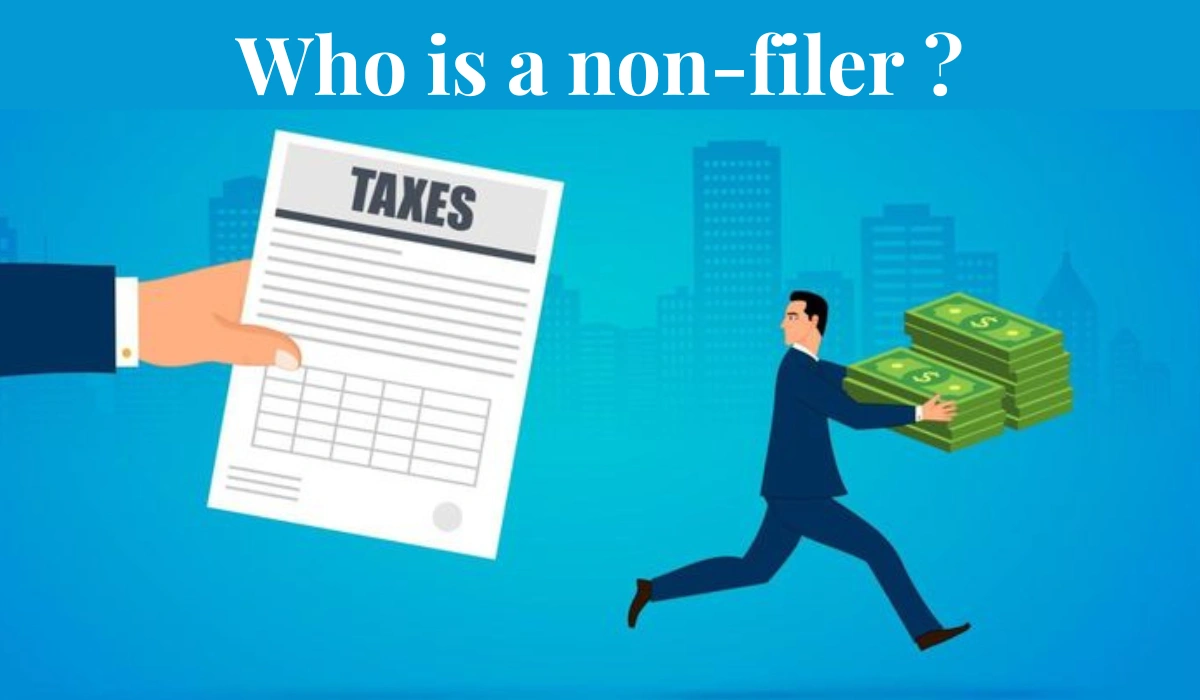Introduction
In Pakistan’s 2025 financial landscape, knowing the difference between filer and non-filer status is crucial for financial planning. The Federal Board of Revenue (FBR) has introduced significant changes in the 2025 Finance Bill that affect taxation rates and benefits for both categories.
Why Does Your Tax Status Matter in 2025?
Filers enjoy up to 50% lower tax rates on property, vehicles, and banking transactions compared to non-filers. However, those who pay their tax return on time are considered filers, and in contrast, those who fail to pay taxes are considered non-filers.
What is Filer and Non-Filer in Pakistan (2025 Update)
A Filer files his/her income tax return annually, and a non filer is who doesn’t. Filer means an Income Tax Filer in Pakistan.
A filer is a person who files an income tax return.
A non-filer is a person who does not file an income tax return.
Who is a Filer ?
The Filer refers to a person or firm who is officially registered with the Federal Board of Revenue (FBR) and regularly files income tax returns. Moreover, filers are the people who are listed on FBR’s Active Taxpayer List (ATL), signifying they are eligible for financial and legal advantages. In contrast, non-filers are those individuals or businesses that are registered with FBR but did not submit their income tax returns. Additionally, if you are wondering who qualifies as a filer in Pakistan, then check out below:
- Income Threshold: Earn above PKR 600,000/year (new limit for 2025)
- Business Owners: Including small shops, freelancers, and online businesses
- Property Owners: Those with assets worth PKR 5 million+ (updated threshold)
- Investors: In stocks, mutual funds, or real estate
- Foreign Income Recipients: Receiving remittances above PKR 1 million/month
Who is a Non-Filer? (2025 Penalties)
A Non-Filer is an individual or entity who is not registered with the FBR or has not filed an income tax return despite being liable to do so.
Non-Filers face the highest withholding tax rates, such as 10% on property purchases and 15% on cash withdrawals exceeding certain limits.
Common Reasons for Non-Filing:
- Lack of awareness about 2025 thresholds
- Complexity in e-filing process
- Fear of tax scrutiny
- Missing deadlines (new June 30 cutoff for 2025)
Key Differences: Filer vs Non-Filer 2025
Category | Filer Benefits | Non-Filer Penalties |
Property Tax | 1% withholding | 2% (100% higher) |
Vehicle Tax | PKR 10,000 (1000cc) | PKR 20,000 |
Bank Withdrawal | 0.3% over PKR 50K | 0.6% |
Loan Approval | 85% success rate | Below 30% |
Int’l Travel | No restrictions | Ticket purchase limits |
Difference Between Filer and Non-Filer in Pakistan 2025
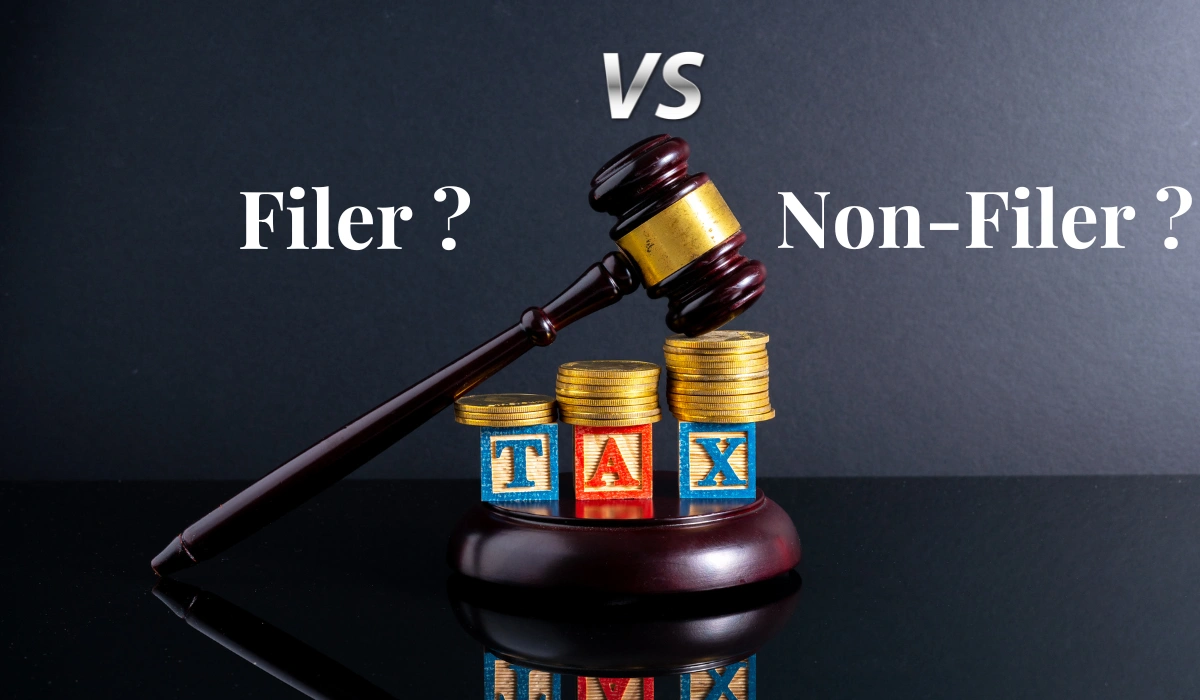
1. Definition
- Filer: A filer is a person and business registered with the FBR who complies with tax regulations and also has a national tax number (NTN).
- Non-Filer: A non-filer is a person or firm who does not file income tax returns and does not comply with tax regulations. They also don’t have an NTN and are not on the FBR’s active taxpayers’ list.
2. Tax Rates
- Filers: Filers benefit from lower tax rates on different financial transactions, like withholding tax on banking transactions, property transactions, and vehicle registrations.
- Non-Filers: Non-filers are required to pay higher tax rates, as the government imposes extra taxes on them
3. Financial Transactions
- Filers: Filers enjoy lower withholding tax rates on cash withdrawals and other banking transactions. Despite that, they also have lower tax rates on the purchase or sale of property, along with vehicle registration and transfer fees.
- Non-filers: Non-filers are subject to face higher withholding tax rates on cash withdrawals, property transactions, and higher registration & transfer fees for vehicles.
4. Banking and Investments
Filers benefit from significantly lower tax rates on cash withdrawals, bank transfers, and other financial transactions.
Filer: A filer pays 0.3% tax on cash withdrawals exceeding PKR 50,000 in a day.
Non-Filer: A non-filer pays double the tax on the same transaction.
5. Property Ownership
- Filers: Filers can easily own a property of their choice with lower tax rates, allowing them to lessen the overall cost of property transactions.
- Non-filers: Non-filers are required to pay higher taxes if they want to purchase or sell property, making it more costly.
6. Vehicle Ownership
- Filers: Filers can seamlessly buy vehicles with lower taxes and also need to pay lower fees when registering or transferring vehicle ownership.
- Non-filers: Non-filers need to pay higher registration and transfer fees, making vehicle ownership more expensive.
7. Business and Trade
- Filers: Filers can start their own business or franchises as they have the advantages of lower tax rates on different transactions, including import and export duties, making their business operations more cost-effective.
- Non-filers: Non-filers who own businesses are subject to higher tax rates and face additional inspection, which, as a result, impacts their profitability and the business’s overall performance.
8. Access to Financial Services
- Filers: Filers can access financial services, including loans and credit facilities. They can easily apply for loans from any bank or financial institution.
- Non-filers: It is difficult for non-filers to secure loans from any bank or other financial institution because of their non-compliance with tax regulations.
Why is it Important to Be a Filer in 2025?
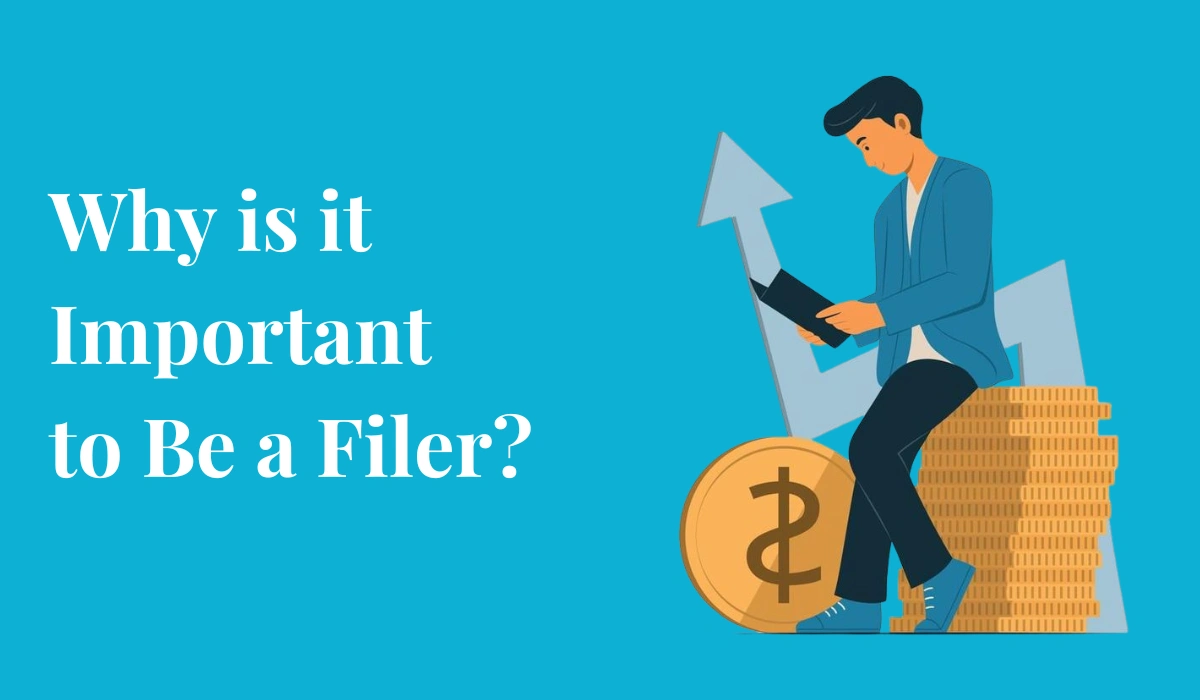
As clarified, being a tax filer in Pakistan comes with massive advantages that can greatly impact your personal and professional life. If you’re wondering how to become a filer in Pakistan, the process is simpler than you think and offers valuable benefits. One of the biggest advantages of becoming a filer is enjoying lower taxes on vehicle registration and property transactions, making it a smart financial move.
- Lower Taxes: Save up to PKR 500,000 annually
Business Growth: Eligible for government contracts
Financial Freedom: No restrictions on property/vehicle purchases
- Legal Protection: Avoid FBR audits and penalties
How to Become a Tax Filer?
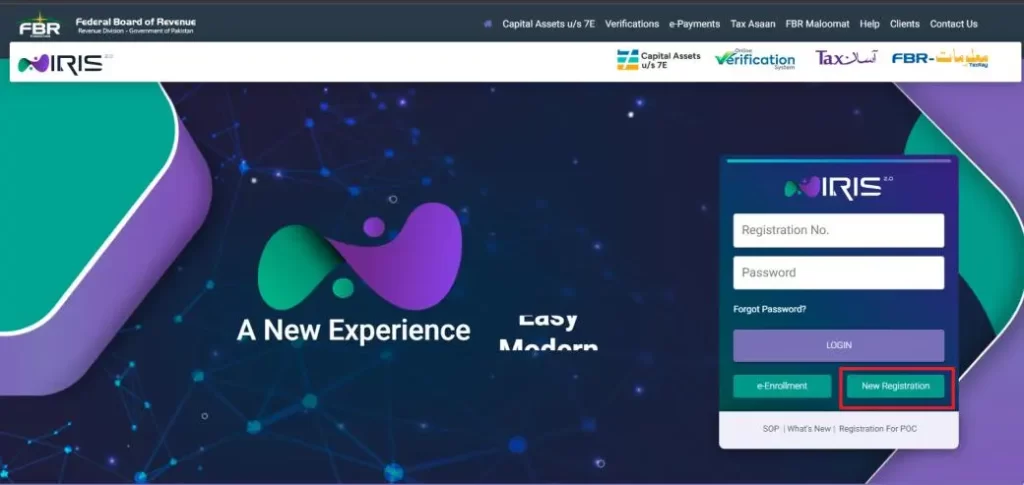 If you are curious to know, how to become tax filer in Pakistan 2025, then there are basically two ways to become a tax filer in Pakistan:
If you are curious to know, how to become tax filer in Pakistan 2025, then there are basically two ways to become a tax filer in Pakistan:
- Visit the Regional Tax Office
- Online Registration
Additionally, manually, all you need to do is visit your nearest regional tax office and fill out the National Tax Number (NTN) form. After that, make sure to submit the needed documents like:
- Computerized National Identity Card
- Bank Statement
- Proof of Residence
- Employer Certificate (if you are an employee
On the other hand, you can also become a tax filer by going through an online procedure. Just open the official site of the FBR, log into the FBR IRS portal, and then fill out the online form for tax filing. After that, the FBR will issue the NTN number, which is known as the CNIC number.
Consequences for Non-Filers
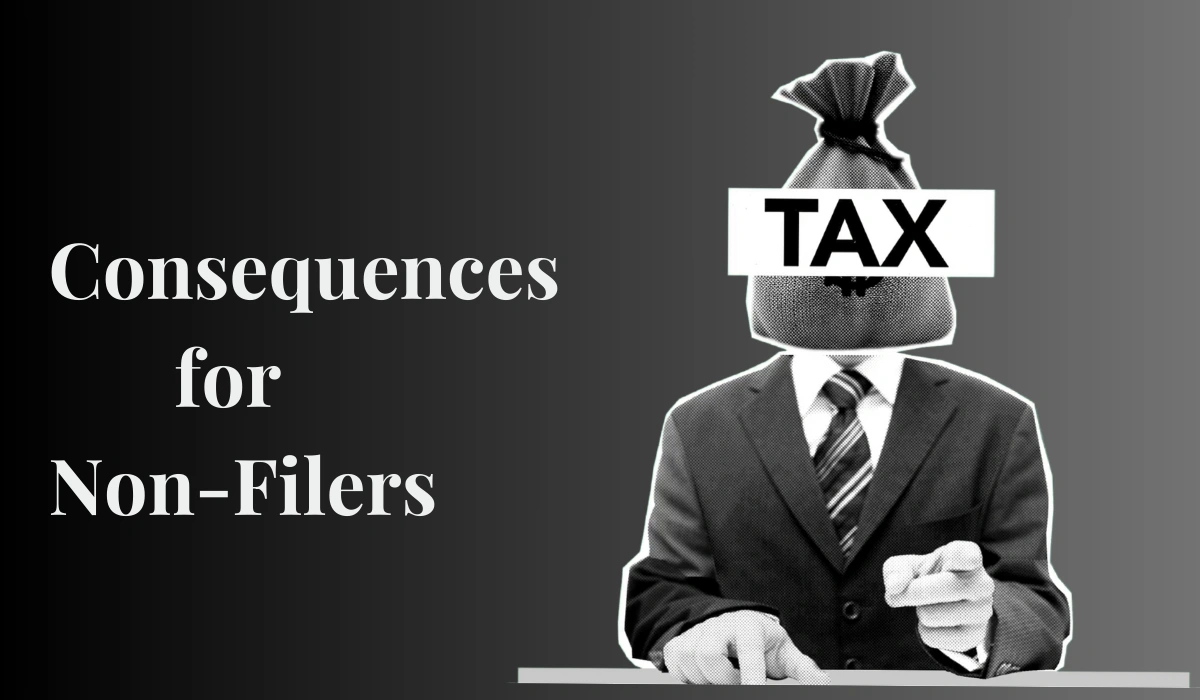
There are numerous consequences for non-filers if they refuse or don’t pay taxes:
1: Financial Penalties:
- PKR 25,000 fine for late filing
- 1% monthly penalty on due tax
2: Lifestyle Restrictions:
- Cannot purchase vehicles above 1300cc
- Property registration blocked in Islamabad/Lahore/Karachi
3: Legal Actions:
- Asset freezing after 2 unfiled years
- Travel ban for tax defaults up to PKR 1 million
Benefits of Becoming a Tax Filer in Pakistan

The following are the advantages of becoming a tax filer in Pakistan:
Bank Transactions: Filers are subject to withdrawing tax of 0.3% on cash withdrawals if the amount exceeds PKR 50,000 in 24 hours. Non-filers will have to pay 0.6 for cash withdrawals.
Property Transactions: Filers pay a withholding tax of 1% of the property’s value. On the other hand, the non-filers pay a 2% tax.
Vehicle Registration: Filers can benefit from the lower tax rates on vehicle registration. For instance, the tax rate for filers registering a 1000cc car is PKR 10,000.
Consistently paying taxes on time will make sure you remain on the FBR’s active tax filers list for a long time. Your this public record will bring you various tax-related benefits you might need for certain financial transactions.
Frequently Asked Questions (FAQs)
Below are the FAQs about the difference between Filer and non-Filer 2025:
Q1: What’s new for filers in 2025?
Ans: 10% tax credit for first-time filers, extended deadline to June 30.
Q2: Can I convert from non-filer to filer?
Ans: Yes, by filing 2 consecutive years’ returns (2024 & 2025).
Q3: What if I earn below PKR 600,000?
Ans: Voluntary filing recommended for future benefits.
Q4: How to check my filer status ?
Ans: SMS your CNIC to 9966 or check on FBR’s ATL portal.
Q5: What is the difference between filer and non-filer tax?
Ans: Filers pay less tax on property purchasing and house renting than non-filers.
Conclusion
The blog has covered comprehensive details regarding the difference between filer and non-Filer 2025. However, now that you are well aware of the benefits and consequences, Nexus Ideas recommends that it is time for you to be a responsible citizen and file your tax return to benefit yourself and the nation.
Your tax return will bring Pakistan a good fund that they can use to enhance the country’s overall growth. So, hurry up, do it fast and contribute to the country’s progress. However, if you are a filer and want to invest in real estate, check out these options: ParkView City Islamabad Town Houses and Blue World City Legends Enclave.


